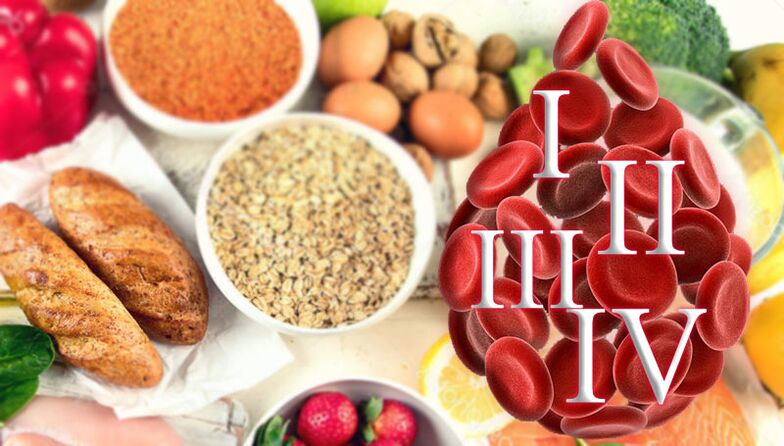The blood group nutrition method was developed by the American physician Peter D'Adamo. According to his theory, the digestibility of food, the efficiency of its use by the body is directly related to a person's genetic characteristics. That is, with your blood group. For the normal functioning of the immune and digestive systems, a person needs to eat foods corresponding to their blood group, that is, those that their ancestors ate in ancient times. Eliminating substances incompatible with the blood from the diet reduces body dross, improves the functioning of internal organs and promotes weight loss. Consumption of the same "foreign" products leads to body degradation and rapid growth of body fat.

The blood group theory of nutrition has generated heated arguments among doctors, which has not subsided so far. Based on D'Adamo's technique, several blood group diets have been developed that have recently become very popular. How, according to D'Adamo, should people with different blood types eat?
Food according to the first blood group
People who have 1 blood group (0) and are called "hunters" must rely on animal proteins and must refuse bread, pasta and dairy products.
Blood group 1 (0) is the oldest and most common. People with the first blood group are meat eaters with a persistent digestive tract, an overactive immune system, and poor adaptation to new diets. The digestive tract of "hunters" has not yet adapted to dairy products and grains.
Especially useful products
Lean meat (lamb, beef), salmon, cod, pike, olive oil, walnuts, pumpkin seeds, beets, figs.
Foods that need to be limited
Dairy products, cheeses, cottage cheese, fatty meats, especially pork, pasta and other flour products, potatoes, strawberries, tangerines, oranges, melons, avocados, corn and peanut butter, olives.
Foods for weight gain
Wheat, corn, beans, beans, cabbage, cauliflower.
Foods to lose weight
Red meat, liver, seafood.
Nutrition according to the second blood group
Representatives of the 2nd blood group (A) - "farmers" - are recommended for vegetarian food.
The emergence of blood group 2 (A) is associated with people's transition to agriculture. Owners of the second blood group are vegetarians with a sensitive digestive tract. They need natural foods that don't harm the environment. People with the second blood group need to exclude meat from the diet: if in the bodies of "hunters" meat is burned for fuel, then in "farmers" it turns into fat. They also poorly assimilate dairy foods. But "farmers" can eat a variety of low-fat natural products, vegetables and cereals.
Especially useful products
Seafood in moderation, soy, beans, beans, buckwheat, rice, artichoke, Jerusalem artichoke, vegetable oils, soy products, vegetables and pineapple.
Foods that need to be limited
Wheat bread, potatoes, apricots, cranberries, ketchup, mayonnaise. It is advisable to completely exclude meat and meat products from the diet.
Foods for weight gain
Meat, dairy, beans, wheat.
Foods to lose weight
Vegetable oils, soy products, vegetables, pineapples.
Nutrition according to the third blood group
Blood type 3 (B) appeared when human tribes began to migrate north into an area with harsh climate. Therefore, the owners of the third blood group D'Adamo calls them "nomads". They have a powerful immune system and can choose foods more freely than people with 1 and 2 blood groups. "Nomads" are the main consumers of milk. A harmonious combination of physical and mental activity will help you to keep fit and in a good mood.
Soybeans, chicken, sunflower oil, tomato and pomegranate are contraindicated in people with the third blood group; all dairy, fish, lamb, rabbit meat and flaxseed oil are helpful.
Especially useful products
Lamb, rabbit, mackerel, cod, plaice, goat cheese, olive oil, oatmeal, rice, parsley, cabbage, pineapple, plum.
Foods that need to be limited
Goose, chicken, beef, pork, heart, shrimp, anchovy, lobster, eel, sunflower, peanut and corn oil, buckwheat, rye bread, tomato, pomegranate, persimmon.
Foods for weight gain
Corn, lentils, peanuts, buckwheat, sesame seeds.
Foods to lose weight
Red meat, liver, liver, low-fat dairy, green vegetables, eggs.
Nutrition according to the fourth blood group
Blood group 4 (AB) appeared less than a thousand years ago as a result of a mixture of other groups. Hence the name: "new people". People with the fourth blood group respond quickly to changes in environment and nutrition. They have a sensitive digestive tract and an overly tolerant immune system. The best way to stay in shape is to combine brain work with light physical activity.
The basis of nutrition for fourth blood group owners should be non-fat foods from sour milk, lamb, venison, vegetables and fruits.
The extra pounds set is influenced by mixed heredity. To lose weight, owners of 4 blood groups need to limit their consumption of meat, combine it with vegetables. Inheritance from B ancestors is a negative insulin reaction to beans, corn, buckwheat, and sesame seeds. But thanks to A ancestors, your body accepts lentils and peanuts well. Unlike both, ABs respond well to wheat.
Especially useful products
Lamb, turkey, cod, mackerel, dairy products, corn oil, oats, wheat bread, kale, cranberries, pineapples.
Foods that need to be limited
Meat, bacon, duck, plaice, crab, salmon, whole milk, oil, pumpkin seeds, beans, buckwheat, radish, avocado, banana, pomegranate.
Foods for weight gain
Red meat, beans, corn, buckwheat, wheat.
Foods to lose weight
Seafood (except canned, dried, dried and smoked), soy, dairy, green vegetables, pineapples.
a small conclusion
Above are foods that are specific to each blood group's diet. However, each of us has its own individual characteristics. Therefore, when choosing foods, when choosing a diet by blood group, one must take into account not only the general recommendations, but also the individuality of each one, above all - the origin and blood group of the ancestors.
Doctors have yet to reach a consensus on the effectiveness of blood type nutrition, although most nutritionists consider this theory to be at least valid. For people suffering from chronic illnesses, blood group nutrition should be used with great care, consult a physician.






























